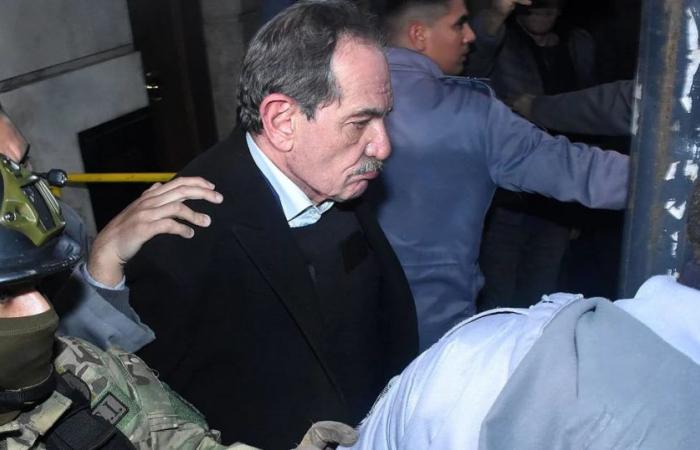Joseph Alperovichthe three-time governor of Tucumán and sentenced to 16 years in prison for abusing and raping his niece, was housed in the sexual abusers ward of the maximum security federal prison in Ezeiza. After an initial period in the prison hospital, where he underwent medical checks, Alperovich is now in a regular ward: residential complex 1.
Prison sources informed Infobae that this week Alperovich went from the hospital to the common ward. He lives with other prisoners, about 25. “All the studies were done, he is in good health with his corresponding medication and he did not show any conflict,” said the consulted source, who added that the pavilion in which he was housed “It’s quiet, there are no problems.”
The pavilions in Ezeiza have a common multipurpose room used by all the detainees and individual cells for each of them. In this unit there is a special one for people detained for sexual crimes. The prisoners are classified according to their profile and the type of crime they committed.
Those arrested for sexual crimes have special treatment. In fact, the Federal Penitentiary Service (SPF) has a special unit for these prisoners. It is Senillosa, in Neuquén. But those who are in the last phases of treatment or when the sentence remains final go there. “Alperovich is starting treatment and will continue in Ezeiza,” the source said. This prison is one of the pre-admission units of the program.
On the other hand, throughout last week Alperovich’s family visited him. They were able to go for five days because the SPF regulations for visits establish that those who live in other provinces, as is the case with their children who live in Tucumán, can visit consecutively.
Alperovich was sentenced on June 18 to 16 years in prison for nine sexual crimes that he committed “through intimidation, abuse of a relationship of dependency, power and authority.” The victim was his niece and the events occurred between 2017 and 2019 in the city of Buenos Aires and Tucumán when she had started working as his private secretary and then in the campaign to become governor again in 2019, elections in which came out fourth.
At the time of the sentence, Judge Ramos Padilla ordered his immediate arrest and that same night he was transferred to the Ezeiza prison by SPF officers.
After being detained, Alperovich’s defense requested his release, which Judge Ramos Padilla rejected. The magistrate held that “If he is released, he will try to evade justice and undermine the objectives of the process.” The defense appealed that decision so that the National Court of Criminal Appeals would intervene and grant him freedom or some kind of mitigation, such as house arrest, to get him out of jail.
The proposal reached the House last week, they informed Infobae judicial sources. The first step will be for the appeal to be analyzed by an admissibility chamber. All the submissions are received there and it is determined whether it meets the requirements for being treated. If so, it goes to one of the three chambers of the House for formal treatment.
To reject his release, Judge Ramos Padilla took into account that Alperovich’s situation changed because he now has a 16-year sentence, that he has the financial means to escape, that during the trial he had obstructive attitudes and that his freedom could mean a revictimization of his niece. “In addition to his economic power, he also has an immense network of social and political contacts that could inevitably facilitate his departure from the country or, if necessary, his hiding.” the magistrate pointed out.
The defense, led by Augusto Garrido, criticized the arguments. He maintained that Alperovich was always within the law, he appeared every time justice required him for the investigation, psychiatric examinations and the delivery of his cell phone and that since the beginning of the case he did not leave the country. He also says that he has roots and that he has health problems.
The lawyer also rejected the argument of political contacts: “No He has a network of political contacts. If anything came of the trial, it was precisely that the entire Tucuman politics turned its back on him. “He is a person convicted of alleged sexual crimes, whose network of contacts is zero, with the exception of his immediate family.”,
Thus, the defense stated that any risk that justice considers can be neutralized with other measures such as “the prohibition of leaving the country; the delivery of travel documents; a geolocation device, or directly house arrest in this city”, and not with detention.


